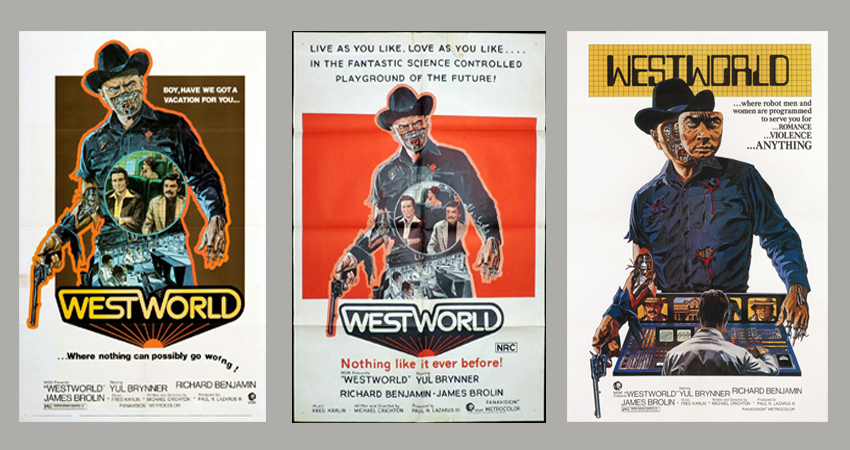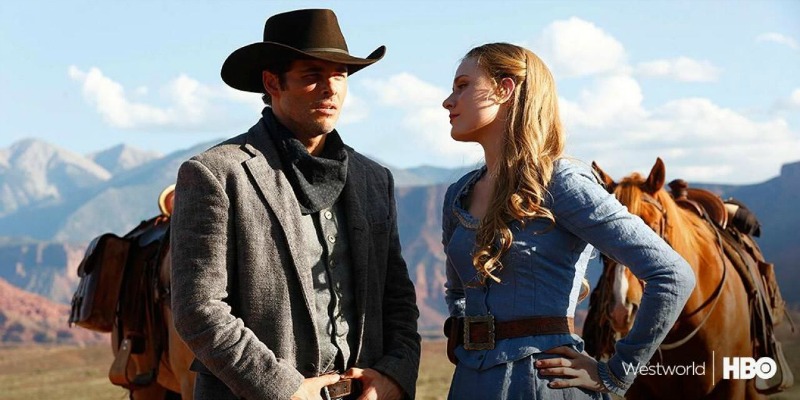
Many years before Michael Crichton created an exotic theme park with creatures from the past made flesh, he created one with futuristic robots brought to life. Not in a novel, but in a film that was far ahead of its time, one that he wrote and directed, the 1973 cult classic, Westworld.
Set in the not-too-distant future, Delos is the ultimate vacation destination, with three different worlds, each revolving around a different theme. The promise is one of a completely authentic and totally immersive experiences, free from any and all consequences, which Delos provides to guests who can afford it. For a bit of unbridled bacchanalia and other hedonistic pleasures, there is Roman World, set in delightful and decadent Pompeii.
Prefer to fight with swords and seduce young maidens? Head on over to Medieval World, modelled on medieval England.
The third is Westworld, which brings to life the American Wild West for guests who’d like to live out their cowboy fantasies, with gunfights and bordellos.

In Westworld you can satisfy appetites of all kinds, without a care for moral scruples or any legal consequences. Because all the inhabitants at Delos are humanoid robots — androids that are virtually indistinguishable from real people. They act like people, feel like people to the touch and yes, bleed like people. Existing only to fulfil the desires of Delos’ guests and serve them in any way imaginable, including – but not limited to – dying a violent death. Which is the role assigned to the Gunslinger – played exceedingly well by Yul Brynner and who looms heavy in the posters above – whose only job, as he’s been programmed to, is to instigate gunfights and then die at the hands of random visitors. Again, and again, and again.
The tagline for the movie Westworld was, ‘Where nothing can possible go wrong’, which means that, in keeping with movie tradition, it does. Because there’s a glitch, a disease that is spreading like an infection among the androids. This disease is self-awareness, consciousness, as the ‘machines’ begin to exhibit free will. In a telling scene, a servant girl in Roman World refuses the physical advances of a guest, only to have the technician monitoring her tell the Delos supervisor, “One of the castle machines isn’t responding… refusing a guest’s seduction!”. No one seems to know the reason behind this, because as the supervisor notes, “These are highly complicated pieces of equipment, almost as complicated as living organisms. In some cases, they’ve been designed by other computers. We don’t know exactly how they work.” Which is saying a lot. Do we really know for sure how consciousness and the ability to be self-aware emerged, even in us humans?
It’s a classic ‘robot gone rogue’ scenario – the creation going against its creator, with the latter portrayed as completely faultless.
Meanwhile, the Gunslinger, tired of and definitely angry at being at the wrong end of the barrel of a six-gun one too many times, goes after the guests only to meet his logical and fated end, in a story that tells this tale through the eyes of the humans. In a classic ‘robot gone rogue’ scenario that – given its time – naturally portrayed the androids as villains and robots as the underclass meant only to be exploited and existing only to serve humans. The creation going against its creator, with the latter portrayed as completely faultless.
But we’ve come a long way from 1973. AI, albeit weak AI, has permeated into our everyday existence. The world’s best minds are taking it very seriously and more than ever before, we’re ready to talk about the question of robot ethics and sentient AI, and yes, with a lot more empathy. While the fears of a Skynet-like scenario persist, there is sympathy for the robot. Even on screen it’s an idea that’s frequently being explored from a very different perspective – from the absurdness of Raj in Big Bang Theory dreaming about being in a relationship with Siri and Joaquin Phoenix’s Theodore Twombly falling in love with an artificially intelligent OS in Her to the empathy towards Ava, the AI humanoid robot protagonist of Ex Machina.
In other words, the timing is just right to visit Westworld again, this time as an HBO series that premiers next month. What it seeks to do is what the movie didn’t fully explore: the androids’ perspective. What were they going through? What did they think about their purpose in life? Their fears, impulses and hopes.
Here’s how HBO’s Westworld is described: “Experience the first vacation destination where you can live without limits. Westworld is a meticulously crafted and artfully designed park offering an unparalleled, immersive world where you have the freedom to become who you’ve always wanted to be—or who you never knew you were. Exist free of rules, laws or judgment. Fulfill your every desire. No impulse is taboo.”

But it’s not a theme park – as Westworld’s creative director, played by Anthony Hopkins, says in the gorgeous-looking trailers, it’s an entire world. Westworld is not a direct remake either, because in this Westworld, humans are not the good guys, while the supposedly non-human are the ones grappling with ethics and morality. It puts the spotlight on the androids, the exploited ‘hosts’, and as we learn more about them, we learn more about ourselves.
Co-created by Jonathan Nolan, the co-writer of Interstellar and The Dark Knight, who’s also directed the first episode, and with JJ Abrams, co-creator of Lost and the only person to have directed both a Star Trek and a Star Wars movie as one of the executive producers, Westworld boasts of a stellar cast that includes Anthony Hopkins, Jeffrey Wright, Thandie Newton, James Marsden, Evan Rachel Wood and a cadaverous Ed Harris as the Gunslinger, albeit one with different motivations.
The androids start off as playthings; hosts built to gratify visitors and Evan Rachel Wood plays the oldest host at Westworld, one in whom (or ‘in which’?) self-awareness emerges. Anthony Hopkins plays God, the creator and the shaper of reality in this futuristic world set in a reimagined past. In a short sequence, one of the newly arrived guests asks a host, “How do I know if you are real?”, to which she replies, “If you cannot tell, does it matter?”
Westworld, then, is a series that will explore the question of what is real and what is not, what it is to be human and what it’s not. And given what we know so far, it is driven by the philosophy and psychology of AI, of sentience and emerging consciousness, and how we, as humans will react to ‘machines’ becoming ‘people’. Of course, with all the action, drama, thrills and spills of a spaghetti western. Get ready.
On that note, I bid you goodbye and hope you see you back here again then, for another edition of New Worlds Weekly. Live long and prosper. May the force be with you.
Also read: Mr. Robot is disturbing because its dark dystopia is pretty close to our reality
Subscribe to FactorDaily
Our daily brief keeps thousands of readers ahead of the curve. More signals, less noise.
To get more stories like this on email, click here and subscribe to our daily brief.
Disclosure: FactorDaily is owned by SourceCode Media, which counts Accel Partners, Blume Ventures and Vijay Shekhar Sharma among its investors. Accel Partners is an early investor in Flipkart. Vijay Shekhar Sharma is the founder of Paytm. None of FactorDaily’s investors have any influence on its reporting about India’s technology and startup ecosystem.








